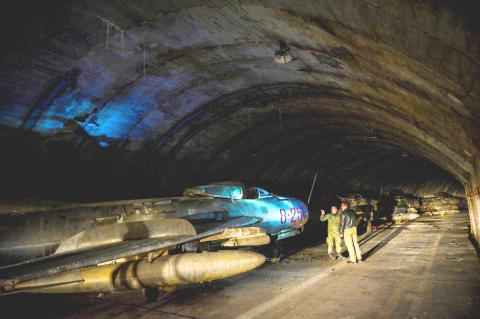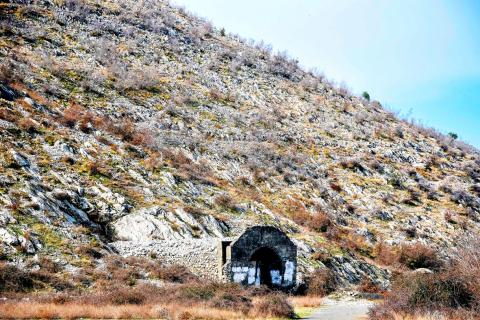On a barren hillside in northern Albania lies a portal to the country’s communist past: A massive steel door creaks open to reveal a hidden former air base burrowed into the heart of the mountain.
Made up of 600m of tunnels that once teemed with military life, the secret Gjader air base is now a depot for dozens of communist-era MiG jets collecting dust in the darkness.
Three decades after shedding communism, Albanian authorities are still trying to sell off the Soviet and Chinese-made aircraft, of which there are dozens more in another nearby air base.

Photo: AFP
“Aligning our equipment and our weapons to the NATO standards” is part of Albania’s “new chapter” with the alliance, which it joined in 2009, Albanian Chief of Defense Bardhyl Kollcaku said.
As for the MiGs, “apart from nostalgia, [for which] we will keep some of them in our museum ... the rest will be treated according to the domestic legislation for sale or other usage,” he said.
The communist-era jets, which include MiG-19, MiG-17 and MiG-21 models among others, have been out of commission for more than a decade, but museums, collectors and other aviation aficionados have already expressed interest in giving the relics a new home.

Photo: AFP
When Albania first discussed selling the MiGs in 2016, requests came in from the Air and Space Museum in France, as well as a flight school in Germany. Yet no sales have been completed to date, with legal paperwork holding up the process.
Individuals are also on the waiting list, including Albania-based French businessman Julien Roche, who plans to install the plane in his garden.
“It’s not so easy to get this kind of aircraft now, because all of them have been mainly destroyed, not stored like they are in Albania,” he said, from a house brimming with eccentric items.
He has put his name down for one of the oldest models, a Chinese-made MiG-15 with a price tag of about 10,000 euros (US$11,000), which was used by North Koreans before being gifted to Albania.
Like the 7,000 concrete security bunkers that dot the countryside, the clandestine Gjader base was part of former communist dictator Enver Hoxha’s plan to fortify his hermit state against feared foreign invasions that never materialized.
More than 600 military personnel used to work inside the maze of tunnels that were shuttered in 2000 and remain off limits to the public. Jets flown after 2000 used a different military base, until the last of the planes were taken out of service following an accident in 2004.
After opening up the dark and damp tunnels to reporters, the base’s commander, Fatmir Danaj, admits the old planes evoke an unexpected nostalgia.
“The pleasure of flying and of working in this base was unimaginable,” 52-year-old Danaj said, as he shone his torch on a row of silver jets, which, as a young pilot, he used to land on the runway that feeds into the mountain.
Today, the scores of rooms inside — including a cafeteria, dorms and array of other offices — are empty except for a scattering of debris and the faded signs on their doors announcing their function.
In one empty office, a reminder still hangs on the wall: “Attention! Put documents in their files and submit them to the secret administrative office before leaving the workplace.”
During his nearly 40 years of rule, Hoxha turned Albania into the most militarized country in the Balkans.
That backfired spectacularly in 1997, seven years after the fall of communism when the country was swept up by an armed rebellion that saw citizens raid armories and military bases for weapons.
Gjader was also breached, with people looting weapons and selling parts of some MiGs as scrap metal. Today the Albanian air force has only a small fleet of helicopters and its air space is protected by NATO.
In a sign of the changing times, the first NATO base in the Balkan region is to be built in Albania’s Kucova, once known as “Stalin City” as a symbol of friendship at that time between Albania and the Soviet Union.
However, Danaj still dreams of seeing Gjader returned to its former glory.
“The base could serve as a museum, but with its modern infrastructure, its tunnel system, it can be functional again and serve NATO,” he said.

‘SHORTSIGHTED’: Using aid as leverage is punitive, would not be regarded well among Pacific Island nations and would further open the door for China, an academic said New Zealand has suspended millions of dollars in budget funding to the Cook Islands, it said yesterday, as the relationship between the two constitutionally linked countries continues to deteriorate amid the island group’s deepening ties with China. A spokesperson for New Zealand Minister of Foreign Affairs Winston Peters said in a statement that New Zealand early this month decided to suspend payment of NZ$18.2 million (US$11 million) in core sector support funding for this year and next year as it “relies on a high trust bilateral relationship.” New Zealand and Australia have become increasingly cautious about China’s growing presence in the Pacific

Indonesia’s Mount Lewotobi Laki-Laki yesterday erupted again with giant ash and smoke plumes after forcing evacuations of villages and flight cancelations, including to and from the resort island of Bali. Several eruptions sent ash up to 5km into the sky on Tuesday evening to yesterday afternoon. An eruption on Tuesday afternoon sent thick, gray clouds 10km into the sky that expanded into a mushroom-shaped ash cloud visible as much as 150km kilometers away. The eruption alert was raised on Tuesday to the highest level and the danger zone where people are recommended to leave was expanded to 8km from the crater. Officers also

The team behind the long-awaited Vera Rubin Observatory in Chile yesterday published their first images, revealing breathtaking views of star-forming regions as well as distant galaxies. More than two decades in the making, the giant US-funded telescope sits perched at the summit of Cerro Pachon in central Chile, where dark skies and dry air provide ideal conditions for observing the cosmos. One of the debut images is a composite of 678 exposures taken over just seven hours, capturing the Trifid Nebula and the Lagoon Nebula — both several thousand light-years from Earth — glowing in vivid pinks against orange-red backdrops. The new image

ESPIONAGE: The British government’s decision on the proposed embassy hinges on the security of underground data cables, a former diplomat has said A US intervention over China’s proposed new embassy in London has thrown a potential resolution “up in the air,” campaigners have said, amid concerns over the site’s proximity to a sensitive hub of critical communication cables. The furor over a new “super-embassy” on the edge of London’s financial district was reignited last week when the White House said it was “deeply concerned” over potential Chinese access to “the sensitive communications of one of our closest allies.” The Dutch parliament has also raised concerns about Beijing’s ideal location of Royal Mint Court, on the edge of the City of London, which has so